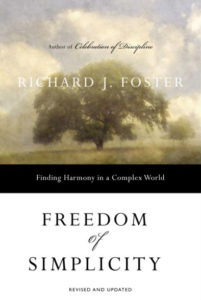To put it in a sentence: less is more.

Freedom of Simplicity by Richard Foster beckons all Christians to reconsider the excess which we allow to consume and define our lives. From over-busy schedules to feeding the ever-present demand for “more”, Foster pushes on the cavities of our heart and probes the reader’s deeper desires, asking from whence they came.
A student and teacher of spiritual disciplines, Richard Foster is also the author of “Celebration of the Disciplines” which changed my life when I read it at 18 years old. Though Celebration of the Disciplines outlines a dozen core spiritual practices, it doesn’t place guilty burdens on the reader or muck things up with philosophical jargon, and nor does Freedom of Simplicity.
The call to the church to reconsider their ways is both gentle and yet profound. Richard makes a strong case for believers to evaluate whether we are playing into the same system that we are fighting against, which is a system that seeks everything but the Kingdom of God first.
He points out that:
“While simplicity provides an answer to the modern dilemma, it does not provide an easy answer.”
The “dilemma”, Foster describes, is that our “Contemporary culture is plagued by the passion to possess… [and] furthermore, the pace of the modern world accentuates our feeling of being fractured and fragmented.” In other words, we’re being crushed by rush.
After laying the groundwork for his case via scripture and history, the book goes on to explore both inner, outer and corporate responses to the call — which I love, because often authors and speakers will draw conviction to an issue by spotlighting it, but fail to offer an appropriate response.
The journey of inner simplicity involves God-granted self-acceptance and choosing to abide in the “divine center”. This divines center offers inner peace and the cure from the seemingly insatiable demand for more. Our identity is no longer wrapped in acquiring stuff and success.
Out of this inner stillness, Foster looks at how obedience to the Holy Spirit simplifies our lives; holiness is not about striving and complicated laws, but simple and pure momentary obedience to God. If we continue to draw back to “the center”, most of life’s anxiety-laden decisions become effortless “yes Lord, okay Lord” experiences.
Through vulnerable examples and relatable stories from his own life, Richard Foster unveils practical steps towards simplicity, such as (in my words):
- The power of saying “no”
- Disengaging from over-involvement in church activities or social commitments
- Community living and the impact of sharing possessions instead of owning
- Avoiding the bombardment of media and its’ inherent lies of marketing
This book, which was written 3 years before my own birth and which I’m now reading 35 years after it was penned, describes a plugged-in and over-consumptive society of America in the 1980’s. How much more valuable and poignant are these words today, considering we’ve been on a non-stop barrel ride down the waterfalls of excess since then?
Foster’s encouragement towards individual lifestyles of self-imposed pseudo-poverty for the sake of spiritual abundance, intertwine with his philosophical over what this would look like at a societal level. Freedom of Simplicity goes on to consider the impact of our consumptive and self-focused decision making on our world.
He makes the case that we can no longer ignore the plight of millions who are suffering starvation, abuse and neglect around the globe. By allowing and benefiting from the products of multinational corporations, we’ve unwittingly affected the lives of people all over the world. Our greed is exacerbating their need.
We don’t get to choose whether or not we are a part of a global economy or not. Our lifestyle has already demanded this; the shoes we wear, the cars we drive, this computer I type on… in the name of affordability and luxury, we’ve allowed a burden to be placed on the third-world, and we have a responsibility to accept that guilt and respond.
In Freedom of Simplicity, Foster only provides a skimming view of the subject, but invites the church to take the lead in acknowledging our part and moving forward towards healing and balance.
Conclusion
In the end, this book hit me squarely between the eyes, convicting me in the midst of the Christmas season and in a time of my life when I was beginning to question my own “success” in the world’s eyes. I happened along the book in the right timing, because it has drawn my thoughts back to God’s perspective on my life and His desire to restore simple love and obedience in His children.
I highly recommend that you pick up a copy of Freedom of Simplicity — or better yet, that you rent it from the library or borrow mine — it just may be the key to unlocking inner simplicity and uncovering God’s design for joy in your life.


 We live in a world where rules abound. Speed limits, seat belt regulations, minimum drinking age, no swimming, no skateboarding, no cell phones, minimum height required… sometimes our rules get wacky:
We live in a world where rules abound. Speed limits, seat belt regulations, minimum drinking age, no swimming, no skateboarding, no cell phones, minimum height required… sometimes our rules get wacky: